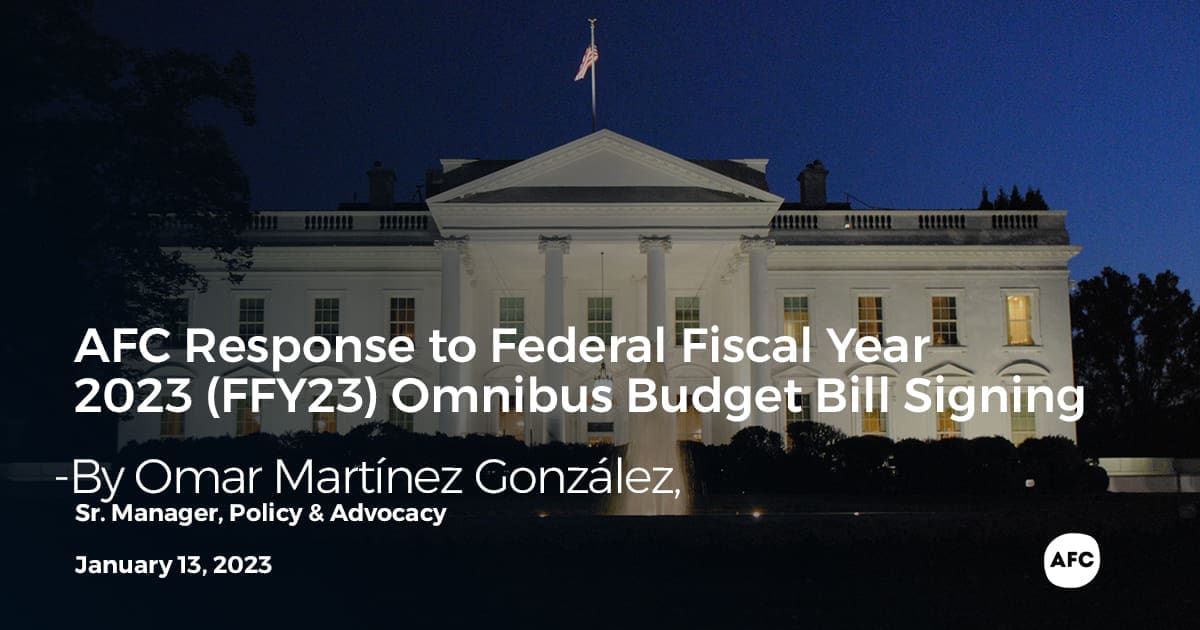By: Omar Martínez González, Sr. Manager, Policy & Advocacy
CHICAGO, IL – On December 29, 2022, President Biden signed a $1.7 trillion omnibus budget bill to fund the federal government through September 30, 2023. The omnibus bill included $858 billion for defense funding and $772.5 billion for non-defense discretionary programs like the Ryan White program to pay for HIV treatment and care for low-income people living with HIV (PLWH), HOPWA which provides housing for low-income PLWH, and HIV/STI testing through the CDC, among many others. The massive funding bill was the final action by the 117th Congress and was signed into law in time to avoid a government shutdown. The following are the provisions that impact those who are living with or who are impacted by HIV:
Elimination of Medicaid continuous enrollment. Flexibilities provided by the federal government during the COVID-19 pandemic allowed states to keep people enrolled in Medicaid without the need to prove eligibility through the annual process known as redetermination/renewal, in exchange for a temporary enhanced federal match rate for Medicaid. The omnibus bill allows states to begin redetermining eligibility of their Medicaid recipients, with people who no longer qualify for the program starting to lose their coverage as of April 1st. It is estimated that 19 million people will lose their Medicaid benefits nationally. In Illinois, it is estimated that just over 500,000 people will lose their Medicaid coverage. If you or someone you know is currently enrolled in Medicaid, you should update your address with the Illinois Department of Healthcare and Family Services (HFS) to avoid benefit disruptions by visiting https://www2.illinois.gov/hfs/MedicalClients/Pages/addresschange.aspx
Overall increases in funding for HIV-specific programs. The omnibus includes the following funding for programs specific to PLWH or those who are vulnerable to HIV:
- $499m in historic funding for the Housing Opportunities for Persons with AIDS (HOPWA) program, a $49m increase over FY22
- $613m for the 4th year of Ending the HIV Epidemic (EHE), an increase of $100m over FY22, with a $25m increase for the CDC’s Ending HIV initiative, $40m increase for the Ryan White program for treatment and care, and $35m increase for the Community Health Centers to focus on PrEP
- $2.571b in funding for the Ryan White HIV/AIDS Program, an increase of $76m over FY22
- $60m for the HHS Minority HIV/AIDS Initiative, an increase of $3.1m, and report language to return the program to its original intent of funding minority-led organizations instead of minority-serving organizations
- $23m for the CDC’s Opioid Related Infectious Disease line, an increase of $5m over FY22
- $10m increase for the CDC’s Division of STI Prevention
The bill failed to include funding for the creation of a national PrEP program despite advocate efforts, although it did include report language in support of expanding access to PrEP to end the HIV epidemic.
Inclusion of the Mainstreaming Addiction Treatment (MAT) Act. The MAT Act was included in the omnibus, which officially waives the buprenorphine X waiver that restricts the ability of medical providers to easily dispense medication-assisted treatment for opioid use disorder. Additionally, the MAT Act eliminates the limit on the number of patients that health care providers can treat for opioid use disorder at any given time, along with removing other barriers that make it harder for clinicians to treat opioid use disorder.
AFC receives $250,000 in Community Projects funding thanks to Rep. Mike Quigley. AFC received a Community Project award of $250,000 in the FY23 omnibus for training and services to better support seniors living with HIV. With improved life expectancy thanks to modern antiretroviral therapy, more people living with HIV are reaching advanced age, which presents unique challenges for clinicians who care for this population. This funding will go towards developing different levels of training to educate Chicago-area HIV providers about the challenges of this growing population.
AFC applauds the 15 Illinois Members of the 117th Congress, which includes all Democrats and two Republicans, who voted to pass this important piece of legislation, as well as our two Senators. Illinoisans living with or impacted by HIV cannot afford to have their well-being jeopardized by politics, and this necessary funding will ensure that service providers in Illinois can continue to care to our communities to ensure we move closer to ending the HIV epidemic in Illinois and the U.S.


